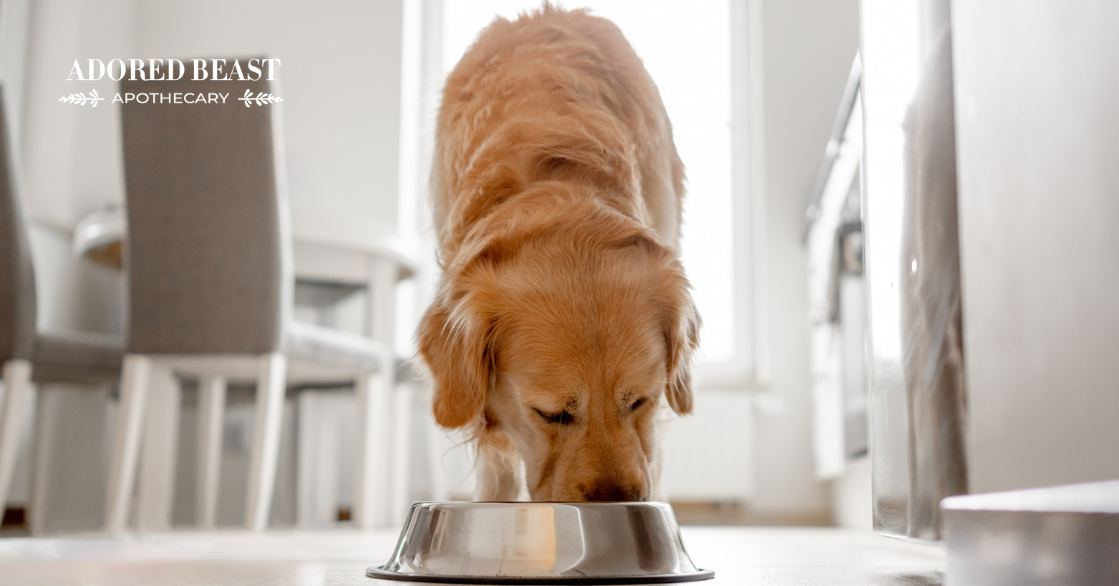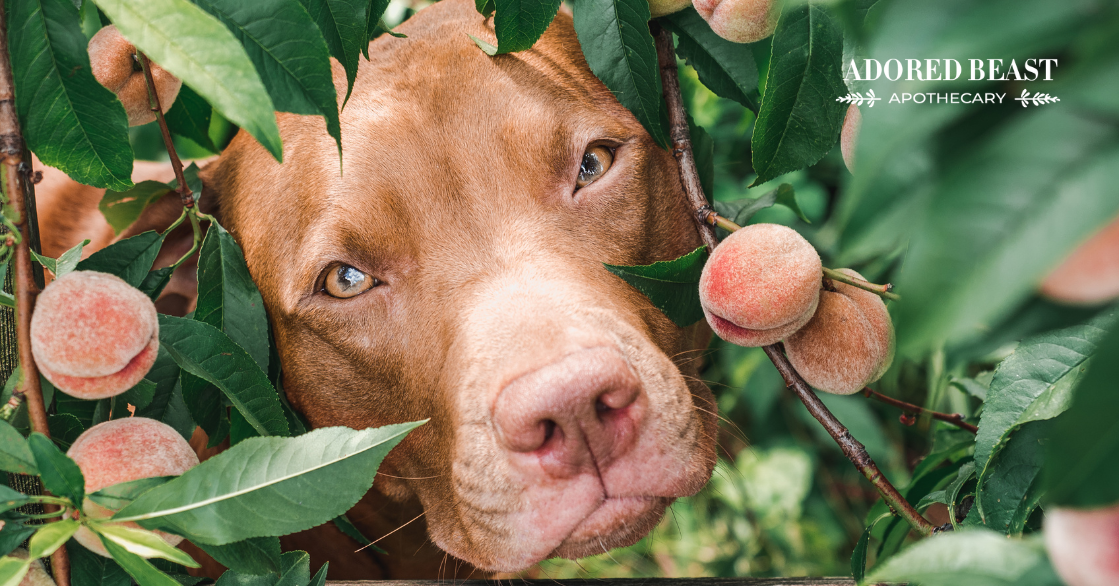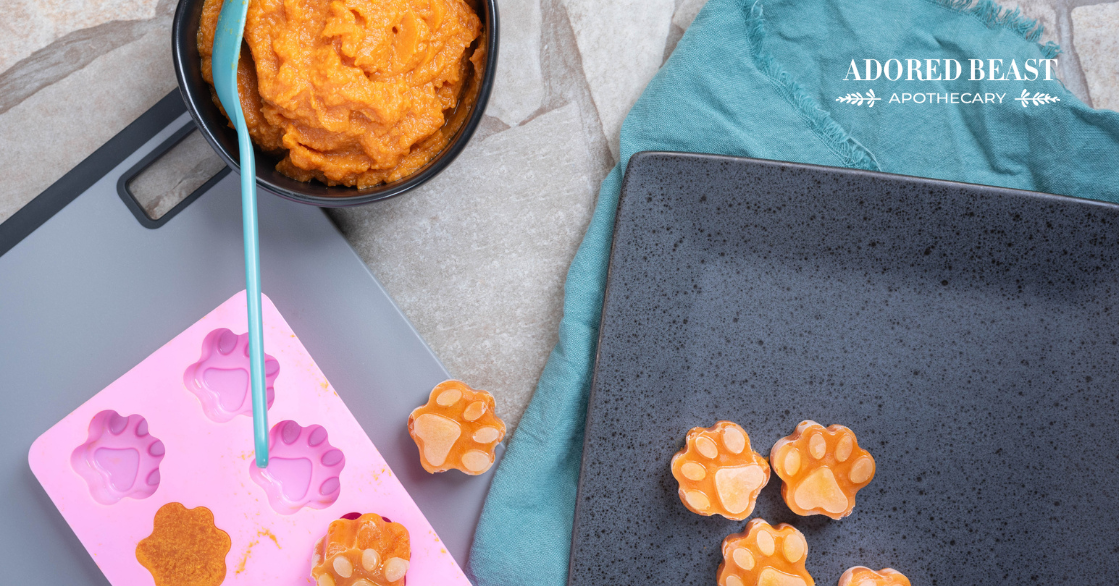We all know we need fiber in our diets. If we don’t eat enough, we all know what happens…
And our dogs need it too!
Fiber for dogs is an important dietary component that aids in digestion and overall health. We need to be sure our dogs are getting it – for many reasons. And we also want to be sure they’re getting it from the right sources.
Thankfully, there are so many foods that can provide our beloved beasts with natural sources of fiber to boost their health!
And that’s what we’ll cover today – why fiber is so important, and how to add it to your dog’s diet!
Fiber for Dogs: Why it’s Important
Dietary fiber comes from plant-based sources and is not digested by dogs’ bodies – digestive enzymes can’t break it down so it remains undigested. Instead, it passes through their digestive tract relatively intact.
Now, there are two different types of dietary fiber – soluble and insoluble. And while neither is digested, soluble fiber is fermented by gut bacteria when it reaches the colon (insoluble doesn’t ferment). Many plants contain both soluble and insoluble fiber, but in different amounts. Both types have their own benefits (they’re covered below).
Why do dogs need it? For a variety of reasons:
- Protects the Gut: Fiber helps massage the gut to reduce inflammation and clean the mucous membranes. Fiber can also bind to toxins in the gut and then eliminate them in the stool. Plus, many contain both pre- and probiotics, which feed and nourish the beneficial bacteria in your dog’s gut.
- Digestive Health: Fiber helps promote regular bowel movements and prevents constipation by adding bulk to the stool. This can be particularly beneficial for dogs prone to gastrointestinal issues.
- Antioxidant Boost: Fiber binds as much as 80% of cancer-stopping antioxidant polyphenols in fruits and vegetables. This protects the antioxidants from being digested in the stomach and small intestine. Fiber then provides safe passage of the antioxidant nutrients to the colon. In the colon they’re released by the beneficial bacteria during fermentation where they protect against disease and cancer.
- Weight Management: Fiber can contribute to a feeling of fullness without adding many calories. This can be helpful for dogs that need to lose weight or maintain a healthy weight.
- Blood Sugar Regulation: Soluble fiber can help regulate blood sugar levels by slowing down the absorption of sugar from the intestines into the bloodstream.
- Anal Gland Health: Adequate fiber intake can contribute to firmer stools, which can assist in expressing the anal glands naturally during bowel movements.
Natural Sources of Functional Fiber for Dogs
These are some of our favourites when it comes natural sources of functional fiber for dogs. By functional, we mean that these are fibers that add value and aren’t just sugars or bulking!
You may already add many of these to your pet’s meals – and that’s awesome! Keep it up.
- Pumpkin: A great source of soluble fiber that can aid in digestion and help with both constipation and diarrhea. Just be sure to either roast your own or buy pure pumpkin puree in cans with no added ingredients (no pumpkin pie filling)!
- Green Beans: Low in calories and high in fiber. Many dogs love the crunch! Feed them raw, cut up in small pieces, or gently steam.
- Apples: Apples are a good source of fiber and vitamin C. Be sure to remove the core and seeds. Chop up small and add to food or feed as a tasty snack.
- Blueberries: Rich in antioxidants and fiber. They can be a tasty treat for dogs.
- Leafy Greens: Spinach and kale are great for adding fiber, but also tons of vitamins and minerals and antioxidants!
- Bananas: A great fruit to add to the bowl for some variety – and for the prebiotics, vitamins and minerals. Bananas are a good occasional treat for dogs.
- Chia Seeds: An excellent source of B vitamins and they’re rich in omega fatty acids, antioxidants, fiber, and minerals like calcium, magnesium and phosphorus.
- Mushrooms: Along with their many other benefits, mushrooms contain a lot of fiber! We like mistake and shiitake because they’re easy to find fresh, but turkey tail, reishi, lion’s mane mushrooms are also rich sources.
- Burdock Root: Contains inulin, a natural prebiotic fiber. As a root vegetable, it also possesses considerably stronger antioxidant activity than common vegetables and fruits.
- Dandelion Greens: Dandelion greens contain a lot of fiber. They’re also great for the liver! Just use a small amount because they can be a diuretic – no more than a 1/4 tsp per 20lbs of bodyweight.
“One of the things that I really love about functional fiber is that it’s a really easy way to bring in a diverse range of prebiotics! You can mix it up and feed a variety of these things. And a little goes a long way – you don’t have to give a lot to get results.” – Julie Anne Lee DCH
For all of these sources, you’ll want to rotate to get all the amazing benefits each one offers. And pay attention to your dog’s poop. If you notice it’s really hard (they’re straining) or really loose, you might want to add a bit more fiber to their existing diet. But don’t overdo it. Dogs should have about 5-10% fruits and veggies in their diet.
Making sure that your dog has exactly what they need to address all parts of their body is crucial, and fiber for dogs is an important part of that. These natural sources make it easy to rotate some fiber-rich options to the bowl, benefiting your pup from nose to tail.












